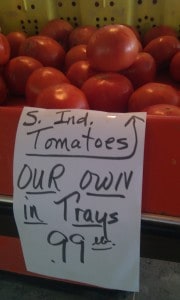
A reader wrote in to ask about helping with his family business:
I am looking at taking over the grocery store my grandfather started 76 years ago. He has passed on and my mom is getting older. I am planning on moving back to my home town of 350 people in the next few years and start helping with the grocery/general store. What kind of training or knowledge should I be looking into so I can help the store be successful and know how to run things?
Thanks,
Scott
By far the best resource site I’ve found for rural grocery stores is the Rural Grocery Initiative from Kansas State University. Their Grocery Store Toolkit has a ton of useful information.
As for topics to study, I’d focus on business basics: management, cash flow, marketing. Many people think you don’t need marketing because everyone will know you’re the grocery store in such a small town, but trust me. People don’t know what all you carry or when you’re open or how you can help them. They’re busy. So marketing is always a great thing to learn more about.
A few of other ideas to consider testing:
- Carry local items, whether food, produce, or other products like local arts and crafts. No far-away store can compete with you on locally-produced items.
- Let young people help you experiment. Let them recommend items, arrange displays the way they’d like or even run a part of the store themselves. They know what younger people want, they’re more willing to try new things, and they’ll be learning and connecting to their community.
- Be open more evening and weekend hours. In a town of 350, your customers have jobs and businesses to take care of during the day. They want to shop evenings and weekends.
- Give better service. Do shopping and deliveries. Let people call ahead for items to pick up. Carry special items people request.
If you run a rural grocery store, I’d love to hear your advice.










